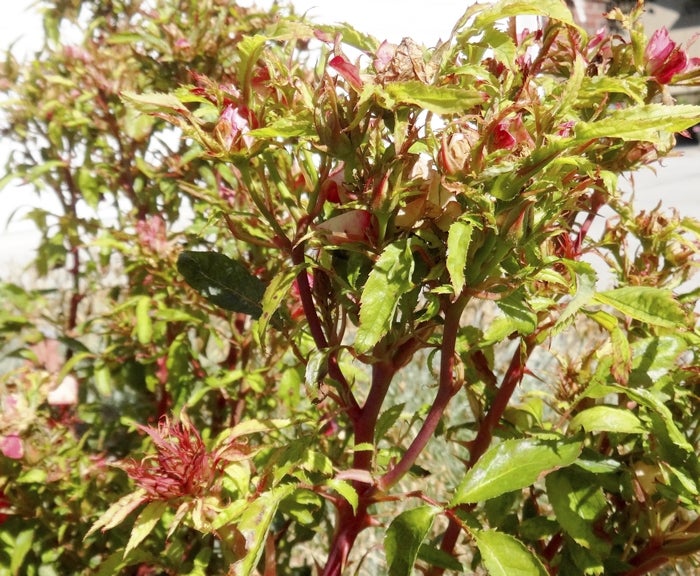Darrell Blackwelder: Heat, humidity compound plant problems
Published 12:03 am Friday, June 12, 2015

- Cooperative Extension Rose rosette is virus that causes the tips to produce a thistle-like growth.
Summer has arrived this week with high humidity and scattered afternoon showers, the perfect environment for insect and disease problems. Home gardeners are experiencing problems in both landscape and vegetable gardens.
Below are a few problems gleaned from home garden inquires received this week from phone calls and often from casual conversations after hours.
Question: I planted my one of wife’s favorite plants, winter daphne, in a really neat container. It was doing very well until a few days ago. Now it is wilted even though I keep it watered on a regular basis. What is the problem? Can I save her plant?
Answer: You most likely will not be able to save the plant. Winter daphne is very susceptible to fungal root disease, Phytophthora. Phytophora is a root-borne fungal disease that not only affects daphne, but also azalea, rhododendron and some vegetable plants. Daphne is one of the exceptional plants known for its wonderful fragrance in early spring that I would continue to plant, even though its life span is often cut short by this disease.
Question: My squash plants are producing fruit, but the young immature fruit are rotting and dying on the vines before they can mature. The plant itself is healthy, but has no fruit. What can be the problem?
Answer: Lack of bees for pollination is probably the problem. Avoid use of pesticides around squash or other cucurbits such as cantaloupes and cucumbers. Bees will eventually come back and pollinate the plant.
Question: I have white fuzzy stuff on my crepe myrtles. What is this and how do I get rid of it?
Answer: The problem is powdery mildew. Powdery mildew is a problem on many cultivars. The weather has been perfect for the disease. Resistant crape myrtle varieties are the most practical method of control. Spraying with fungicides may be an option if the trees are small. Go to http://www.ces.ncsu.edu/depts/pp/notes/Ornamental/odin004/odin004.htm for more detailed information on powdery mildew on crape myrtles and other ornamental plants.
Question: I planted some rose bushes (sample brought in to the office) around my home a few years ago and they have really done well. This year they started to sprout in the spring and they look like they’ve been sprayed with an herbicide. I sprayed my lawn a few weeks ago and was wondering if this is causing the problem. Anything I can do to reverse the problem?
Answer: The rose you have is infected with rose rosette disease. Unfortunately there is nothing you can do to save the rose bushes. Rose rosette is a systemic virus that infects the entire plant. Therefore, pruning out infected canes will not stop the disease. Go to http://guilford.ces.ncsu.edu/2014/06/rose-rosette-disease/ for more detailed information about this disease on roses.
Darrell Blackwelder is an agricultural agent in charge of horticulture with the North Carolina Cooperative Extension Service in Rowan County.




